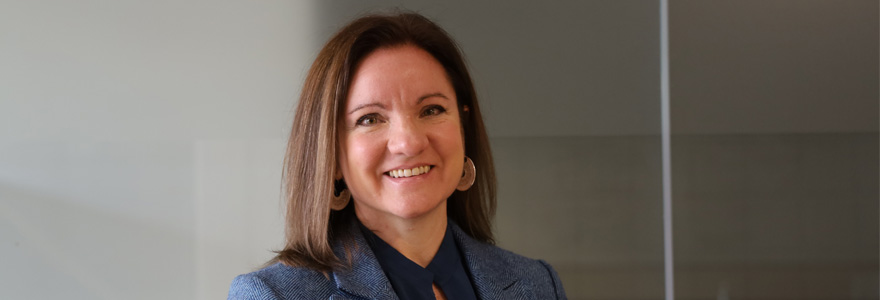News and Updates
Contact
Faculty of Social Science
Social Science Centre
Room 9438
Western University
T. 519-661-2053
F. 519-661-3868
E. social-science@uwo.ca
Religion, Politics and COVID-19 in the United States
March 27, 2023
Amanda Friesen, Associate professor, Department of Political Science
Photo and story by Rob Rombouts
In 2020, as COVID-19 swept across the world, many churches closed their doors – at the request of governments - to slow the spread of the disease. Services moved online and church leaders shared public health messages. Yet, some churches stood in opposition, defying public health measures.
What made the difference, and why did some churches adopt while others opposed public health measures? Amanda Friesen and her colleague Paul Djupe saw an opportunity to understand what role religion – and different expressions of religion – can have in encouraging collective action.
Friesen is a professor in the departments of political science, and gender, sexuality and women’s studies. Djupe directs Data for Political Research at Denison University. Both study religion and politics in the United States. Leading up to the 2020 election, many political scientists were already in a position to collect data as they had secured funding and were developing public opinion surveys. Friesen and Djupe recruited other experts in the field, and used the research plans to add questions about how people understood the pandemic. The result is a carefully planned, edited volume of social science research.
Their findings are published in “An Epidemic among My People: Religion, Politics and COVID-19 in the United States” and highlight how particular aspects of religion – such as denomination, whether the congregation was led by a man or woman, and belief in prosperity gospel – correlate to different understandings of and responses to, the pandemic.
The book was recently included in the Knowledge Unlatched Select 2023 Humanities and Social Science Frontlist Collection for Open Access publication, making it available for anyone to access.
The role of religion
Though the majority of religious communities adhered to shutdown protocols, congregations led by women were more likely to move services online, and members of those congregations were more likely to report feeling their religious leaders had the best health interests of the congregation at heart.
A chapter co-authored by Friesen focused on media usage, and whether people reported trusting then-President Donald Trump, or the Centres for Disease Control (CDC) to provide accurate information about the pandemic. Those who identify as Evangelical Christians were more likely than any other religious group or those with no religion to trust President Trump to tell the truth about COVID, though there were no differences between religious groups on trust for the CDC or their most trusted news source. Those people who trusted Trump to deliver accurate information, were, however, less likely to have an accurate understanding of how many cases of COVID-19 were reported. Catholic Americans were also more likely to both underestimate and overestimate COVID cases.
Religious people, in general, were more likely to believe in conspiracy theories about COVID-19. “If you are a religious individual, you more often believe in the supernatural, and have a faith in things unseen,” said Friesen, “so to believe in conspiracy theories or magical thinking is less of a logical leap.”
Evangelical Christians were more likely to have purchased guns in the early stages of the pandemic, but they reported their purchases being more about concerns over civil unrest or the upcoming election than being connected to the pandemic.
People who reported a belief in the prosperity gospel – the idea that financial and physical well-being are the will of God – were less likely to adhere to public health measures. Others, who are part of religious communities more focused on mutual care, were more likely to follow public health rules. Friesen said that, for many people, religion is impacted by people’s political beliefs, and they may be drawn to religions that reflect their worldview.
Ongoing impacts
During the pandemic, many people may have found solace in religion and used the continued connection to their communities to counter mental health and loneliness aspects reported. “While a lot has been written how organized religion can be problematic, and the ways in which people who use religious institutions for harm – supporting colonization, clergy abuse, subjugation of women – religious organizations have served as pro-social organizations, and religious community helps people,” said Friesen.
How people interacted with religion, or approached their own religious lives varied. As in-person religious gatherings were halted, there was a corresponding massive drop in attending in-person religious services, and an increase in viewing and streaming religious services. There was not, however, a change in how often people reported engaging in private prayer.
As health measures have lifted, Friesen expects some churches may continue to use technology to make services available to more people, which may increase religious participation, particularly for those with accessibility concerns. For some, religiosity increased as they found strength in religion during times of crisis. For others who may have already been wavering on their religious adherence, the pandemic may have been a breaking point of sorts. As services moved online and it became more difficult to participate, it was an opportunity to leave the church.
A key takeaway, Friesen said, is understanding how people get their information.
“The story is where people are getting information, and how important it is,” said Friesen. “Trust in media and trust in experts are impacted by people’s religious beliefs and membership. That’s a particular American thing in a lot of ways.”
“We learned more about how we can better use messaging in religious communities about how to create safety in the community,” she said. In the event of future health crisis, “public health officials may consider how they can be considerate of religious communities or use religious communities to get message across.”

